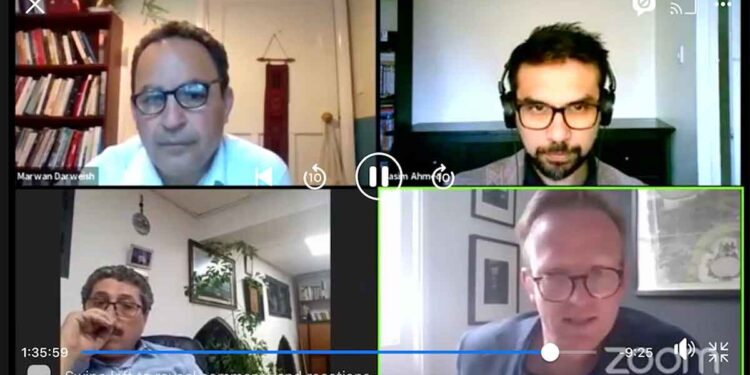Human rights activists and political and legal experts have called on the international community to take action against Israel for its repeated breach of international law and the human rights of Palestinians.
The individuals were taking part in an online seminar entitled “Israel’s Law Enforcement on the Palestinians Living Under its Rule” organised by the Arab Organisation for Human Rights in the UK (AOHR UK) on Thursday, June 4, 2021.
Participants discussed the discriminatory laws that Israel enforces on the Palestinians in the Occupied Palestinian Territories, and also the laws that ignore when it deals with Palestinian communities.
Those taking part gave a historical perspective to the current situation in occupied Palestine, charting the sequence of political events from the formation of the state of Israel in 1948 to the present day.
Several participants in the seminar are members of the Palestinian community in Israel and therefore live under the systematic discrimination enshrined in the Israeli legal system. They explained their own histories and many other stories of Israeli Arabs who struggle under this discriminatory system.
The discussion was mostly focused on how Israel enforces its discriminatory laws of collective punishment against Palestinian protesters who joined recent protests in response to Israeli forces’ attacks in Jerusalem, the West Bank, occupied territories, and the Gaza Strip.
Also under discussion was the Israeli law of confiscation, which targets Palestinians’ property, such as land and homes. The speakers noted that Israel will at the same time ignore the increasing number of crimes, such as murder and possession of weapons, used against the Arab communities in Israel.
Nasim Ahmed, Senior Researcher for Middle East Monitor, moderated the seminar and condemned the inequality in the Palestinians’ struggle within the Occupied Palestinian Territories. He also affirmed that despite being Israeli citizens, Arabs are treated as second-class citizens and are deprived of most of their human rights by the Israeli government.
Jafar Farrah, Director of the Mossawah Center, highlighted the struggles of Palestinians in the Occupied Palestinian Territories as they resisted displacement from their homes and land. He noted that they are resisting the discriminatory laws that Israel imposes on them. He said: “We suffer from systematic discrimination, not only in social and economic issues but also legal discrimination like immigration and ownership of land.”
Farrah also emphasised that the Palestinian community has become powerful, and it could influence the elections in Israel. This, he argued, made the Palestinian political voice audible in Israel.
Farrah also stated that the Israeli Arabs are mentally and linguistically unique, and therefore they are targeted by the racist far-right Israeli settler groups. However, he believes that Israeli Arabs can be the game changers in building a new vision for the Palestinian-Jewish relationship for future generations.
Marwan Darwish, Associate Professor at the Centre for Trust, Peace and Social Relations at Coventry University, started his argument by saying that the Arab community’s resistance made it an important political force that neither the Palestinians nor Israel can ignore.
Darwish added that “the first 20 years of the Palestinian resistance is called the hidden resistance or resisting quietly; it wasn’t confrontational but rather resilience”. He said the Palestinian “quiet” form of resistance included elements like art and poetry, and that even the Palestinian wedding could become a tool of this resistance.
Rhys Davies, a barrister specialising in International Criminal Law and International Human Rights Law, expressed his astonishment at the statistics that show the inequality in the enforcement of Israeli law on Arabs and Jews. He said that such issues do not grab the international community’s attention, which explains why there is a lack of reaction in the field of international law regarding the issue.
Furthermore, Davies argued that the Israeli government’s stance of essentially ignoring criminality against Arab communities in Israel is part of the collective punishment against them. He said: “We see an increase in criminality and failure in investigating when it comes to the Arab communities.” He said that this was evidence of the Israeli government’s plan to weaken Arab communities in the country.
At the end of the seminar, the participants called for the international community to censor Israel in response to its abuses of human rights, as being silent on Israel’s structural discrimination against Israeli Arabs is to be complicit.






























